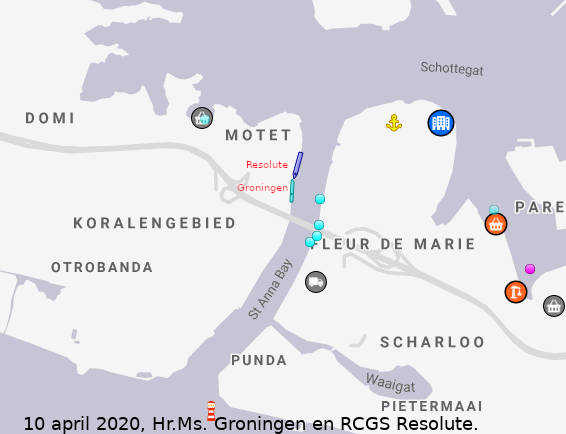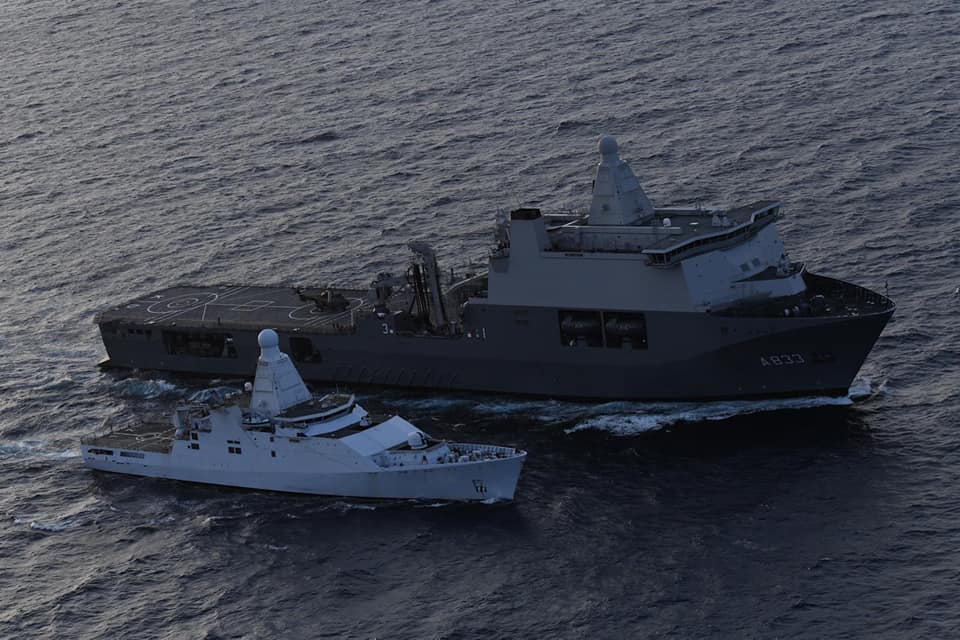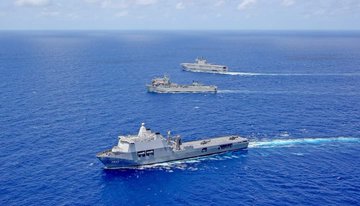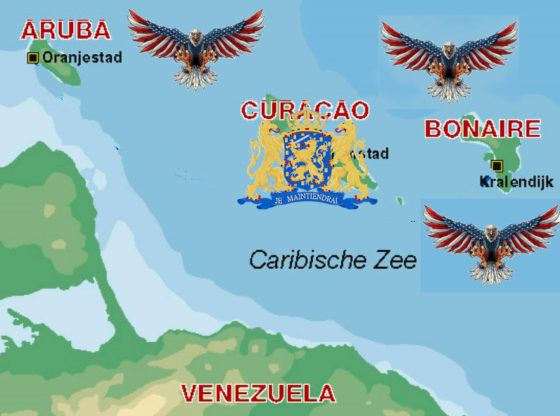Source: Handsoffvenezuela.nl, 12 December 2020 (NL)
Curacao adopts legislation to prepare for maximum pressure on Venezuela. This is the third part of a series of articles. The earlier parts were published in this public archive on July 20, 2020 and August 30, 2020.
Three days before the people of Venezuela will elect a new parliament (National Assembly – AN), the parliament in Curaçao adopts, with a narrow majority, an amendment to the law for exceptional circumstances. It is the “National Ordinance Exceptional Situation” (there is an identical bill for Aruba). It describes the powers that the government will have and the prescriptions and interdictions that will apply to the population in case of an emergency situation, ” …that threaten the existence of the country or society, including war” (quote from article 2, paragraph 1)
Specific fundamental rights of the Dutch Constitution and the Kingdom Statute, which should give the population essential legal protection against arbitrariness, aggression and abuse of power by their government, will be eliminated by this new law in the event of such an emergency (such as a war). The law makes mutual communication and communication with the outside world punishable, as well as any form of gathering, research and resistance. It authorizes the government to severely punish this and, moreover, to carry out searches at any time and anywhere without showing proof of identity, without authorization and without giving a reason, and to demand property , notes, communications and documents. Even one’s house and all other possessions may be confiscated indefinitely without reason. The population can be prohibited from going to locations to be determined,…. and more. The PM’s were pressured to vote for the law.
It cannot be denied that the drafting and adoption of such legislation makes it clear that the people are seen as enemies of the government. This is normal in colonies and occupied territories, but the inhabitants of Aruba and Curaçao have good reason to believe that their islands are free, not occupied, and ex-colonial.
It is considered that the covid pandemic requires such a provision (although not mentioned in the legal articles) and the same smokescreen has been used before, such as for the deployment of three attack-supporting warships this summer, including the largest and most expensive Dutch warship, HNLMS Karel Doorman.
There was a lot of criticism and also street protests in Willemstad. Yet, after inserting the stipulation that a number of articles will only come into effect in case of war or a terrorist attack, the amendment of the law was adopted by the Parliament of Curaçao with a narrow majority.
The bill was prepared a long time ago, not to support a corona-lockdown– there was no such thing then–but for a different agenda. The smoke screen ‘corona’ has worked.
(Since September 11, 2001, alleged terrorism has in fact also been used as a smokescreen for legislative changes).
Preceding research in 2016
A lot has changed in the region, and it started long before there was a pandemic with a feasibility study by Emic, a subsidiary of SCL.
SCL-subsidiaries, such as Cambridge Analytica and Emic have done research in many conflict zones and have influenced the development [remove ‘s’] in line with the agendas of their clients [remove ‘paying’]. This summer it came to light that in 2016 the Dutch Ministry of Defence sent a group of researchers/influencers to Curaçao, who received a course beforehand from Emic, an SCL training group. The specific assignment for the contractors was to conduct research in Curaçao into expected population behavior in case the presence of military personnel would increase (quote from the NRC of June 26, 2020):
“As a first job, Wolf will investigate how the population on Curaçao and Aruba thinks about the military presence on the islands. For years now, every morning, updated information about the political situation in Venezuela and the possible consequences for the Caribbean islands has been lying on the desk of the Dutch Minister of Defence in The Hague. What if refugees cross over, ask the islands for assistance and if there will be many more Dutch uniforms walking around? Would the residents accept that or would they revolt? And then what?
The commander on the islands wants to know it all, the Directorate of Operations in The Hague gave permission and then Wolf flew with five others, including Gaby van den Berg of SCL Group, to the Caribbean islands to investigate this issue using the Behavioral Dynamics Methodology (BDM) method.
It takes some get acquainted. It is difficult to define a target group, and after about fifty interviews they are convinced: the islanders will accept military presence [remove ‘it turns out’]. At the same time they have no idea what the military is doing there.
“Show more clearly what you are doing while it is still quiet”, the team advises Wolf and Van den Berg from Den Helder via a video connection to the overseas commander.
The Ministry of Defense is happy with the results and hires extra communication advisors. The military are practicing outside the gate more often, even if that is not necessarily necessary”. (End of quote)
The result was that the population would have no problem with the military claiming more and more space. On the basis of that research and the advice to show themselves more often while it is still quiet, the military started practicing outside the barracks more often and society has become gradually militarized.
The aforementioned ‘Directorate of Operations’ (DOPS) of the Dutch Defence Staff is ‘responsible for the military planning, preparation, command, execution and evaluation of Dutch participation in a military operation’. The Dutch commander in the Caribbean, until recently Peter v.d. Vin, leads section 4.4 of Joint Inter-agency Task Force-South, and has frequent contact with its central command in Key West, Florida.
In which military operation in the vicinity of Curacao could the Netherlands participate? We go a little further back in history: The Obama decrees of 2015 and 2016.
On March 8, 2015, former U.S. President Barack Obama turned a Congressional bill, Public Law 113-278, into Executive Order 13692, also known as the “Obama Decree. This decree identifies the Venezuelan state as an “unusual and extraordinary threat to U.S. national security,” It is the beginning of a long list of “sanctions,” which should make things extremely difficult for the country and the people, similar to the strangling sanctions that preceded the wars against Iraq, Libya and Syria. The decree was renewed by Obama in March 2016.
In February 2018 SouthCom’s longest serving commander and military strategist wrote the Masterstroke Plan. It provides insight into the far-reaching actions of the US and allies carried out from that time onwards, or are still on the role. The inclusion of Venezuela’s neighboring countries in the preparations for a military invasion is described in the master plan. Shortly after its publication, Kurt Tidd retired and transferred the leadership of SouthCom to the hawk Craig Faller.
The Plans of Stef Blok, the new Minister of Foreign Affairs
More openly and rapidly, changes on the ABC islands were prepared from April 2018 under the leadership of the newly appointed Minister of Foreign Affairs, Stef Blok. Despite the fact that he unintentionally introduced himself as a racist immediately after his appointment, and revealed his colonial ideas even before that, his first travel destinations in the first week of April were the Caribbean islands and Colombia. There he had been offered an open letter from concerned citizens pleading for a better treatment of Venezuelans. But apparently the minister did not come for this. According to his own words, he had big plans with the Caribbean islands. [footnote 1]
A number of these changes are currently realized: Strict deterrent enforcement of the U.S. trade ban with Venezuela; cessation of the agreement with Venezuela to rent and operate the ISLA Refinery; Strict repressive policy against temporary immigrants from Venezuela; introduction of a Standard of Forces Agreement (SOFA) with the U.S.; expansion of coastguard and military facilities; Permission for operational flights of an AWACS, a JSTARS and two U.S. Stratotankers from the renovated runway of Curacao; X300 Integrator drones and a Dutch drone team of 20 specialists on Aruba (nothing is mentioned about trainers and others involved); visa requirement for Venezuelans who want to visit the islands; ….. and according to Stef Blok, there is more to come.
Aggressive incidents
Aruba and Curaçao were already previously involved in openly aggressive incidents, which could have ended seriously.
A Polar-Ice cruise ship, the RCGS Resolute, intruded and remained on 29 and 30 March in the territorial waters of Venezuela. The Venezuelan Coast Guard ship that summoned the cruise ship to leave was deliberately and fatally rammed, causing it to sink. The crew of the cruise ship then offered no help to the crew, but fled to Willemstad Haven, Curaçao, where it enjoyed months of protection, with the order from higher ups not to investigate. In the end, the local judiciary condemned the ship’s crew on the basis of Venezuelan investigations and imposed the highest possible fine on the shipping company.
According to the Venezuelan security forces, the ship, which sailed under the Portuguese flag, that is under Navo protection, had a group of armed mercenaries and zodiac speedboats on board. The twelve MK5 and two MK6 zodiacs (military grade rubber dinghies) on board, can put ashore 220 people/38,000kg at high speed.
In addition to the small ships of the Coast Guard of the ABC islands, large Dutch warships are sailing in the South Caribbean Sea, under the command of Joint Inter-agency Task Force-South (JIATF-South), based in Key West, Florida. They are c.a. 100 meters long modernized amphibious patrol ships of the Holland class. The warships sail without location signalling to intercept alleged cocaine transports. It is impossible to control what they are doing there, and on a number of occasions the allegation of a large cocaine catch did not match available navigation data.

At the beginning of April 2020 such a ship, the Hr.Ms. Groningen, was moored for several days next to the crime suspect Arctic Cruise ship RCGS Resolute at the quay in the port of Willemstad, before it left the region with destination den Helder with its AIS location transmitter switched off.
Warships and a coastal invasion
At the beginning of May, shortly after it was decided in a NATO meeting to coordinate the war against corona under American command, Dutch, French and English warships were deployed for ‘corona aid’ in the Caribbean region. The Parliament was informed of this by letter on behalf of defense minister Bijleveld shortly before the departure. The French and English warships were already on their way to the Caribbean Sea.
So in the month of May there were at least two large Dutch warships in the region. This coincided remarkably with a planned armed attack on the Venezuelan coast: a mercenary invasion from Colombia, carried out in the early morning of Sunday, May 3, 2020, with a stopover on Aruba.

KarelDoorman and Zeeland 
KarelDoorman(NL), Dixmude(FR) and Argus(GB)
The amphibious attack-supporting warship HNLMS Karel Doorman, with possibly 2000 meters of movable army equipment on board, was stationed two days earlier in the sea area between Curaçao and Venezuela, together with the Amphibious Patrol Ship, HNLMS Zeeland. There were more army units and militias on standby during that failed attack, including French, English, Israeli, American and Colombian.
The HNLMS Karel Doorman, according to official reports deployed to help with the covid pandemic, albeit under the coordination of the NavoCommander in the US, switched off his AIS location signal during clandestine maritime actions by SouthCom, such as the (threat of) piracy and naval blockade against five Iranian oil tankers in the following weeks. It is therefore likely that it took part in these clandestine actions. It then left early for its home port in den Helder. No evaluation nor any report of actual pandemic relief has been made public. There were reports that the crew was ‘bored’ (and assaulted by the commander).
Country packages and laws of the Dutch Kingdom
This year Curacao and Aruba had payment problems. In the mainstream Dutch media and by Dutch government spokespersons the emphasis is placed on an alleged financial mismanagement of previous governments, but financial support is to a large extent necessary to compensate for an economic downsizing that Minister Blok, by order of the U.S., forced the islands to implement: The ban on trade, economic cooperation, tourism and other exchanges with Venezuela; the closure of the ISLA refinery, which was operated by Venezuela until January 2020 and provided more than 1,000 jobs. And since May the strict corona measures to protect and continue colonial tourism.
In order to get this financial support, Curaçao and Aruba were forced to accept ‘land packages’ with far-reaching conditions. These land packages increase the legal power of the Netherlands over its former colonies and determine, among other things, the expansion of the police, security services and coastguard, as well as the reorganization within the army and are part of a conscious policy to further transform the islands into colonial tourism resorts and military bastions. There will be little room for other employment in those plans.
That was also the conclusion of journalist Andre Vltchek, who was investigating in Aruba shortly before his sudden death in September 2020.
“Aruba is not paradise. It is a small, depressing island, dotted with kitschy pseudo-Dutch buildings, fake tram lines, casinos, and private beaches and islands. It is an isle abandoned to North American tastes: those of tourists, as well as military planners and hawks. And Netherlands, increasingly right-wing, is playing go-in-between. It is literally pimping its colonies, offering them for an immoral fight against Venezuela.
Representatives of a number of civil society groups have jointly raised the land packages that have been imposed on them with the UN’s decolonization commission. But with the recently adopted ‘National Ordinance’, the subsequent declaration of a state of emergency, its extension to the open sea and the zero-tolerance policy, re-colonization continues and the underlying agenda for maximum pressure on Venezuela is taking shape.
The policy of transforming the ABC islands into colonial vacation resorts and military bases is based on the results of the SCL study of 2016, which indicated its feasibility.
The Netherlands is blackmailing its overseas compatriots to implement a hidden agenda, instead of lending them a helping hand in this emergency situation. The current governments of Aruba and Curacao are very accommodating, as a result of which a large part of the plans of the USA, by Minister Blok on behalf of the Netherlands, have been realized.
Whether there will indeed be an incident under false flag is still an open question. The imminent threat emanating from all these preparations can already be judged as unlawful aggression against a sovereign neighboring country.
As an appropriate response, observation drones could be deployed in the contiguous security zone (up to 24 nautical miles from the coast), with immediate reporting to the UN, the ICC and reliable media of all incidents. The tense situation in Brazil, Chile, Colombia, Ecuador and Peru could reasonably discourage the empire from throwing even more oil on the fire.
Footnotes
]1] According to an official statement, Stef Blok’s visit to Colombia was for consultations on the Venezuelan labor migrants in Colombia. At the same time, Bram Ebus wrote an imaginative slanderous story, which aimed to link the flow of labor migrants to alleged state repression and abuses in Venezuela:
“Venezuela is in serious crisis on all fronts. President Nicolas Maduro is behaving like a dictator and his army, secret services and police are oppressing the people with a heavy hand. …. hundreds of opponents of the regime [are] tortured in dungeons with electric shocks. In nationwide protests against the government, more than 125 protesters lost their lives on the streets last year as a result of the state violence”.
Bram Ebus has several faces, but we know him as the journalist paid by the US for his Dutch, Spanish and English negative fantasy stories about Venezuela, which many established media, including the VPRO and the Correspondent, spread uncontrollably as a supposed reality. He also happens to be a consultant for the Latin America agency of the CrisisGroup.
[2] The parliament in The Hague did not receive any information about this, nor did it have access to the ships’ cargo taken and possibly left behind upon return
